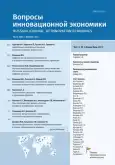Vol 13, No 2 (2023)
Articles
Digitalization of economic relations as a factor of countries' sustainable development
Abstract
 615-636
615-636


External constraints on digital industrial transformation and industrial policy
Abstract
 637-648
637-648


Innovative development institutions as an element of economic security mechanism in digital economy development
Abstract
 649-668
649-668


Formation of a new model of the domestic economy in the context of technological sovereignty: principles and mechanisms
Abstract
 669-688
669-688


Technological sovereignty: variant approaches
Abstract
 689-706
689-706


How artificial intelligence helps transform the digital economy
Abstract
 707-726
707-726


Global trends in the development and regulation of artificial intelligence
Abstract
 727-748
727-748


Artificial intelligence in the mirror of innovative change in the mobilization economy
Abstract
 749-770
749-770


Managing the digital transformation of organizations with artificial intelligence
Abstract
The increasing complexity of the social and economic structures of human society leads to the need to develop more effective and progressive management methods. The increasing digitalization of the global world has also affected the sphere of management principles. The concept of digitalization includes the transfer to computer algorithms of partially or completely functions previously acting on human decisions. However, some new approaches and concepts of doing business can be revolutionary and involve a complete change in the approaches of our society to management. This determines the relevance of this study.An overview of modern research and development in the field of artificial intelligence is presented. Information on the artificial intelligence development trends, allowing to support the implementation and management of artificial intelligence systems, is provided. The authors focus on the real potential benefits of digital transformation, as well as consider the associated benefits and some concerns. Examples of leaders in the industry are given. The authors discuss the topic of planning activities for the application of digital transformation.The analyzed trends of activity in the field of digital transformation, as well as the prospects of artificial intelligence in the fields of management and project planning, may be interesting and useful for theorists and practitioners solving the problem of practical application of digital tools for designing a modern management system. The study is supported by an analysis of the advantages and disadvantages of this process, as well as examples of Russian companies that successfully implement artificial intelligence technology.
 771-784
771-784


Challenges of the artificial intelligence economy to the traditional labor market
Abstract
 785-802
785-802


Introduction of a virtual currency system: cryptocurrency and digital currency analysis and differentiation
Abstract
 803-820
803-820


Benefits of financial controls based on the digital ruble
Abstract
 821-836
821-836


Introduction of digital technologies by banks to overcome financial imbalances in modern conditions
Abstract
 837-848
837-848


Strategies for cross-border banking interaction in the transformation of foreign economic relations
Abstract
 849-870
849-870


Trends and prospects of fintech development amidst macroeconomic instability
Abstract
 871-880
871-880


Regional innovation ecosystem: assessment of the effectiveness of functioning in the conditions of digitalization
Abstract
 881-900
881-900


Major aspects in managing innovative territorial development in the current national context
Abstract
 901-914
901-914


Resource-deficient region and opportunities for implementing investment policy in new conditions
Abstract
 915-926
915-926


Rating as a method of assessing innovative and scientific and technological development of Russian regions
Abstract
 927-940
927-940


Directions for building the oil and gas region's innovation ecosystem
Abstract
 941-954
941-954


Assessing the effectiveness of the innovation system of the Far Eastern Federal District regions
Abstract
 955-968
955-968


Interdisciplinarity in university education as a factor of the regional innovative development
Abstract
 969-986
969-986


Development of the vocational training system based on the products of the digital economy
Abstract
 987-1004
987-1004


Fuzzy competence model in modern startups
Abstract
 1005-1018
1005-1018


Creative industries start-ups: shaping the start-up industry. Russian and Chinese experience
Abstract
 1019-1034
1019-1034


The international competitiveness of the digital economy in Russia and Сhina
Abstract
The article is aimed at studying the digital economy of China and Russia in the context of international competition. The analysis of the international competitiveness of the digital economy is carried out at three levels: individual, market and country. The digital economy of the main international competitors is compared in terms of the impact of digital products on the international market, digital infrastructure, and social application of digital technology, which contain a total of 15 indicators. The advantages and problem areas of the digital economy development in China and Russia are summarized; and their prospects in the digital economy are indicated.
 1035-1052
1035-1052


The Digital Silk Road as a tool for enhancing China's sectoral competitiveness
Abstract
 1053-1070
1053-1070


Innovation as a factor for the further development of the Cooperation Council for the Arab States of the Gulf
Abstract
 1071-1086
1071-1086


Current trends in digitalization in the global energy sector
Abstract
 1087-1104
1087-1104


The latest trends in global MA market
Abstract
 1105-1120
1105-1120













